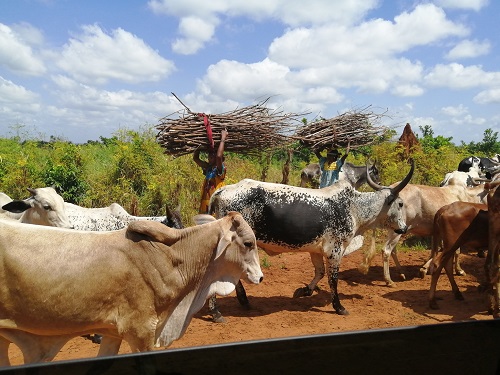Access and Authority Nexus in Farmer-Herder Conflicts (AAN) Project

The Access and Authority Nexus in Farmer-Herder Conflicts (AAN) Project investigates the dynamic processes of formation and erosion of access, identities and authority in spatial and historical perspectives. Through a theoretical lens guided by political ecology, and in particular the concepts of frontiers and territorialization, it understands the conflict as a dynamic process whereby people seek access and try to legitimize their claims as property. Governing institutions (statutory, customary and hybrid) compete over the validation of claims and as a consequence constantly build, maintain, or lose their authority. This is state-building in the making. The approach taken in AAN offers a novel way of investigating natural resource conflicts as part of state formation.
Project Coordinator
Partner institutions




Project participants
Boateng Kyereh, Associate Professor, Dean, Faculty of Renewable Natural Resources, Kwame Nkrumah University of Science and Technology, kyerehb@gmail.com, bkyere.canr@knust.edu.gh,
Paul Osei-Tutu (PhD), Lecturer, Department of Forest Resource Technology, Kwame Nkrumah University of Science and Technology, p.oseitutu@gmail.com, posei-tutu@knust.edu.gh
Lawrence Kwabena Brobbey (PhD), Postdoc, Department of Silviculture and Forest Management, Kwame Nkrumah University of Science and Technology, lawrencebrobbey@yahoo.co.uk
Frank Kwaku Agyei (PhD), Postdoc, Department of Silviculture and Forest Management, Kwame Nkrumah University of Science and Technology, frankkagyei@yahoo.com,
Issah Suhiyini, Alhassan, PhD Fellow, Department of Silviculture and Forest Management, Kwame Nkrumah University of Science and Technology, issahsuhiyini@yahoo.com
Vincent Kusi-Kyei, PhD Fellow, Department of Silviculture and Forest Management, Kwame Nkrumah University of Science and Technology, vincent.kusikyei@gmail.com
Abdulai Abubakari (PhD), Director, Institute of Interdisciplinary Research and Consultancy Serices (IIRaCS), University for Development Studies, abkaria72@yahoo.co.uk, addulai.abubakari@uds.edu.gh
Daniel Kojo Leon Brenya Yeboah, PhD Fellow, University for Development Studies, leo.lion.leon@gmail.com
Mrs. Mercy Afua Adutwumwaa Derkyi (PhD), Senior Lecturer, Dean, School of Natural Resources, University of Energy and Natural Resources, mercy.derkyi@uenr.edu.gh
Christian Pilegaard Hansen, Associate Professor, Department of Food and Resource Economics, University of Copenhagen, cph@ifro.ku.dk
Mariève Pouliot, Associate Professor, Department of Food and Resource Economics, University of Copenhagen, mapo@ifro.ku.dk
Christian Lund, Professor, Department of Food and Resource Economics, University of Copenhagen, clund@ifro.ku.dk
Short description
Farmer-herder conflicts constitute a major area of natural resource conflicts in Ghana and the
West African sub-region at large. Several instances of the conflicts have been reported in the
region, particularly in Ghana and Nigeria, with some single instances recording more than 80
human deaths. The competition over land has social, political and institutional consequences.
While there is an ethnic dimension to the conflict which makes it easy to fuel with tenacious
stereotypes, the conflict is more fundamentally about the categorization of landscapes as pasture or farmland, the recognition of claims as rights, and the constitution of public authority. In short, the conflict between herders and farmers is an instance of state building at the local scale.
Mainstream work on resource conflicts has focused on root causes such as ‘environmental
scarcity’ (e.g. Baechler, 1998; Collier, 2010; Homer-Dixon, 1999; Kaplan, 1994) and ‘institutional
failure’ (e.g. Goldman, 1998; Peters 1987). Over the past three decades, studies generally
adhering to political ecology orientation have attempted analyses of how socio-political, ecological and economic factors jointly contribute to conflicts and how conflicts played out in a local arena may be associated with structural changes taking place at higher scales (e.g. Boone, 2013, 2017; Escobar, 2006; Hall et al., 2011; Peluso et al., 2012; Robbins, 2010). In relation to natural resource conflicts in Africa, scholars have pointed at unfavourable agricultural policies (Bassett, 1988), anti-pastoral policy environment (Benjaminsen et al., 2009, 2012), lack of state presence in rural areas and corruption (Benjaminsen et al., 2012) and climate change (Olaniyan et al, 2015).
In AAN, we combine political ecology with the theorization of frontiers and territorialisation to
study the process of state building. Frontiers may be understood as “sites where authorities,
sovereignties, and hegemonies of the recent past have been or are currently being challenged by new enclosures, territorializations, and property regimes” (Peluso and Lund, 2011: 668). Such a conceptualization moves away from a classic understanding of frontiers as linear movements in space and time (Geiger, 2008; Turner, 1921). Next, territorialization is defined as the creation of systems of resource control, e.g. rights, authorities, rules and laws (Rasmussen and Lund, 2018: 388). New situations, in this case, herder migration into new areas, establish frontiers and challenge existing patterns of access to resources and simultaneously reinterpret, reinvent, and recycle institutional orders (Rasmussen and Lund, 2018). Frontiers are thus linked to social and political struggle, and the process of territorialization prompts new claims of access, legitimacy and authority. AAN is studying how politico-legal institutions build, maintain, or lose their authority through the dynamics of frontiers and territorialization, and how this translates into enfranchisement of rights for some people, and loss of rights for others.
AAN strengthens research capacity through three embedded PhD studies and two Postdocs closely coordinated with senior staff from Ghana and Denmark. The project will offer one international PhD course on frontiers and territorialisation; 12 manuscripts for peer reviewed journals; one panel on farmer-herder conflicts in a major international research conference; case description/documentation to be used in MSc learning activities at
the Ghanaian and Danish universities; and eight MSc/MPhil theses. To link research, policy and practice, AAN will organise 10 district and two national levels forum meetings; three policy briefs; a video on farmer-herder conflicts; and one national science and policy workshop at the end of the project to share and discuss research findings and further their application.
Period
July 2019 to June 2023
Financing source
DANIDA
Amount
DKK 11,689,232
AAN proceedings
See Inception Report
Media coverage
https://www.youtube.com/watch?v=TTIH87DrPR4&t=15s
Contact
